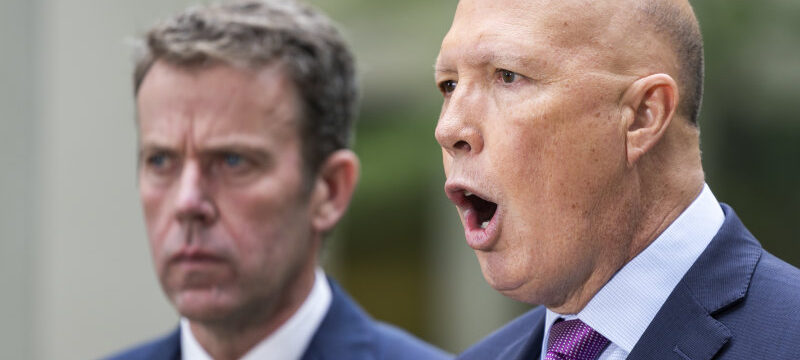Save articles for later
Add articles to your saved list and come back to them any time.
Opposition Leader Peter Dutton is pushing Labor to re-detain a cohort of non-citizens who cannot be deported, as immigration lawyers representing the newly released group of 84 claim new laws passed on Thursday to curtail the group may be unconstitutional.
After the High Court last week ruled against the indefinite detention of foreigners unable to be deported, ministers claimed for days they needed to see the court’s reasons before introducing new legislation. But on Thursday, the government rushed through laws to impose curfews and electronic monitoring devices on the released detainees.
Shadow Minister for Immigration and Citizenship Dan Tehan and Opposition Leader Peter Dutton claim it is possible to use legislation to re-detain the released group.Credit: Alex Ellinghausen
Labor’s proposed laws were strengthened even further when the government caved into demands by Dutton to impose stricter conditions on the group.
Despite the court’s decision, Dutton argued the government could create further laws to put the group – a portion of whom committed serious crimes including murder and sexual offences – back into detention.
“If I was writing the government’s policy, these people would be back in detention because we’re talking about some pretty serious criminals, and the first and foremost thought here is for the victims,” Dutton said on Nine’s Today program.
“We had one hour to draft these amendments and there would have been a lot more that we would have done, but time was not on our side yesterday, but we ended up getting some changes and I hope that that gives us a chance of making the community a little bit safer.”
Opposition immigration spokesman Dan Tehan, speaking on ABC TV, said the opposition believed it was possible to use preventive detention legislation to re-detain the group.
“You can set up a new regime and that’s what the government should have been looking at since June, when it became clear there was a possibility that the High Court would rule the way that it did,” he said.
However, lawyer Alison Battison, who represents 16 members of the released cohort, said the laws passed on Thursday, which do not re-detain the individuals, were “potentially challengeable” in the courts.
“They are a disproportionate response to a particular cohort – the only thing they have in common is being impacted by a High Court decision,” she said.
University of Canberra professor Kim Rubenstein also said the law could be subject to challenge if the measures were seen as punitive.
“If a regular Australian citizen released from fulfilling a criminal sentence was not subject to equivalent conditions on parole, then there’d be a question, I think, of whether this is punitive,” she said.
Education Minister Jason Clare has defended the government’s handling of the High Court ruling, arguing the parliamentary response was the fastest he has seen in his 16 years.
Speaking on Seven’s Sunrise program, Clare said the passing of emergency legislation on Thursday night, which places stricter conditions on the detainees, was parliament “working at its best, the way the parliament should work”.
“You’ve got to know what you’re dealing with, so you make sure that you write laws that work,” he said.
“Certainly people are dirty with this decision [to not re-detain the convicted criminals], if we had our way these people would still be locked up.”
Clare disagreed the government was unprepared for the High Court decision, saying they needed to see the decision before writing legislation.
But after a parliamentary victory on Thursday, in which Labor conceded Dutton’s hardline approach to monitoring the individuals was appropriate, the opposition leader went on the attack again on Friday morning.
Dutton argued the government had months to anticipate the High Court outcome that indefinite immigration detention was illegal and should have had legislation ready last week when the decision was handed down.
“The government had since June to draft this legislation. Earlier in the week, on Monday and Tuesday, they were saying there’s no legislation that can fix it … in the end, it turns out that there was legislation that they could pass,” he said.
Cut through the noise of federal politics with news, views and expert analysis from Jacqueline Maley. Subscribers can sign up to our weekly Inside Politics newsletter here.
Most Viewed in Politics
From our partners
Source: Read Full Article

